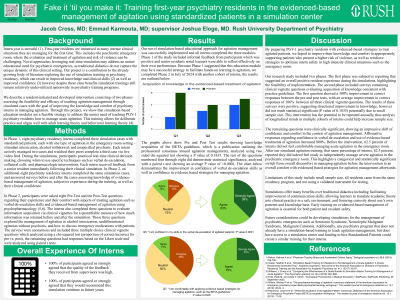Training, Education, Mentorship, and Career Development
(198) Fake it ‘til you make it: training first-year psychiatry residents in the evidenced-based management of agitation using standardized patients in a simulation center

- JC
Jacob Cross, MD (he/him/his)
Hispanic Psychiatry Fellow
Yale School of Medicine
Chicago, Illinois - JE
Joshua Eloge, MD
Associate Director, Woman's Board Depression Treatment Research Center, Assistant Professor
Rush University Medical Center
Chicago, Illinois - EK
Emmad Karmouta, MD
Resident Physician
Rush University Medical Center
Chicago, Illinois
Presenting Author(s)
Co-Author(s)
Background: Intern year is stressful (Ridout, 2019). First-year residents are immersed in a number of intense clinical situations they are managing for the first time. This includes the psychiatric emergency room, where the evaluation and treatment of agitation and risk of violence can be challenging. Novel approaches leveraging real-time simulation may address an unmet educational need for psychiatric emergencies, as traditional didactics do not capture the unique dynamic of this clinical setting. We describe a resident-initiated and developed intervention consisting of two phases aiming to assess feasibility of teaching agitation management through simulated cases and to improve the knowledge and comfort of psychiatry interns in managing agitation.
- Simulations offer many benefits over traditional didactics: facilitating improvement of communication skills, allowing learners to translate academic theory into clinical practice in a safe environment, and fostering curiosity about one’s own patterns and knowledge base - Early training on evidenced-based management of agitation is essential for both patient and resident safety - In addition to this educational module being feasible to implement, surveys will assess acquisition of knowledge consistent with practice guidelines - Future considerations would be developing simulations for the management of psychiatric emergencies (Serotonin Syndrome, Neuroleptic Malignant Syndrome, Malignant Catatonia) 1) Ridout, Kathryn K et al. “Physician-Training Stress and Accelerated Cellular Aging.” Biological psychiatry vol. 86,9 (2019): 725-730. 2) Felix, Heidi M. and Leslie V. Simon. “Conceptual Frameworks in Medical Simulation.” StatPearls, StatPearls Publishing, 26 September 2022.
Methods: In phase 1, eight psychiatry residency interns completed three simulation cases featuring different types of agitation – stimulant intoxication, alcohol withdrawal, and unspecified psychosis. Each intern actively managed two cases and watched their peers complete a third case via live video feed. Each intern received feedback from a senior resident immediately following their clinical simulation. In phase 2, an additional eight psychiatry residency interns will complete the same simulation cases, and will answer surveys before and after the cases assessing knowledge of evidence-based management of agitation, subjective experience during the training, intervention’s influence on practice, and their clinical confidence.
Results: Our novel simulation-based educational approach for agitation management was successfully implemented and all interns completed the three modules. Informal feedback from participants was positive and senior resident facilitators noted learners were able to reflect effectively on their own performance. Results from phase 1 suggest that this education module may be a successful strategy to facilitate hands-on learning in agitation. Results from phase 2 will be outlined after its completion in July of 2024.
Discussion: Simulation-based education modules are a feasible strategy to address the unmet need of teaching first-year residents how to manage acute agitation. This training allows for deliberate practice and aligns well with adult learning theory and behavioral learning theory (Felix, 2022). By preparing first-year psychiatry residents with evidenced-based strategies to treat agitated patients, we hope to improve their knowledge and comfort in appropriately supporting patients who present a higher risk of violence, as well as reinforce strategies to optimize intern safety in high intensity clinical situations.
Implications:
References:
Presentation Eligibility: Not previously published or presented
Diversity, Equity, and Inclusion: There are ample opportunities for implicit and systemic bias to appear in the management of agitation. Teaching interns evidenced-based strategies using our model may influence how bias manifests in clinical decisions when managing agitation. Best practice and consensus guidelines, specifically Project BETA, presented during this training does not include any pharmacology recommendations based on demographics, only structured strategies based on presenting symptoms, which encourages all patients be treated equally. Project BETA also includes a focus on verbal de-escalation as well as medical evaluation, both of which are often lacking in the historical management of patients presenting with psychiatric complaints.

